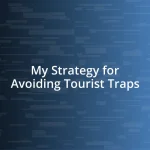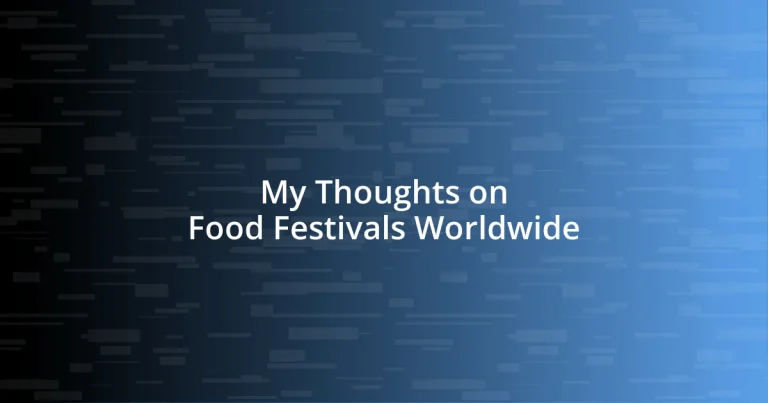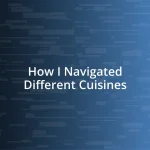Key takeaways:
- Food festivals celebrate culinary diversity while promoting local culture and community connections through shared experiences and stories.
- Popular global festivals like La Tomatina, Oktoberfest, and the New Orleans Jazz & Heritage Festival showcase unique local cuisines and foster cultural exchange.
- Effective tips for attending food festivals include arriving early, wearing comfortable shoes, and seeking vendor recommendations for a richer culinary experience.
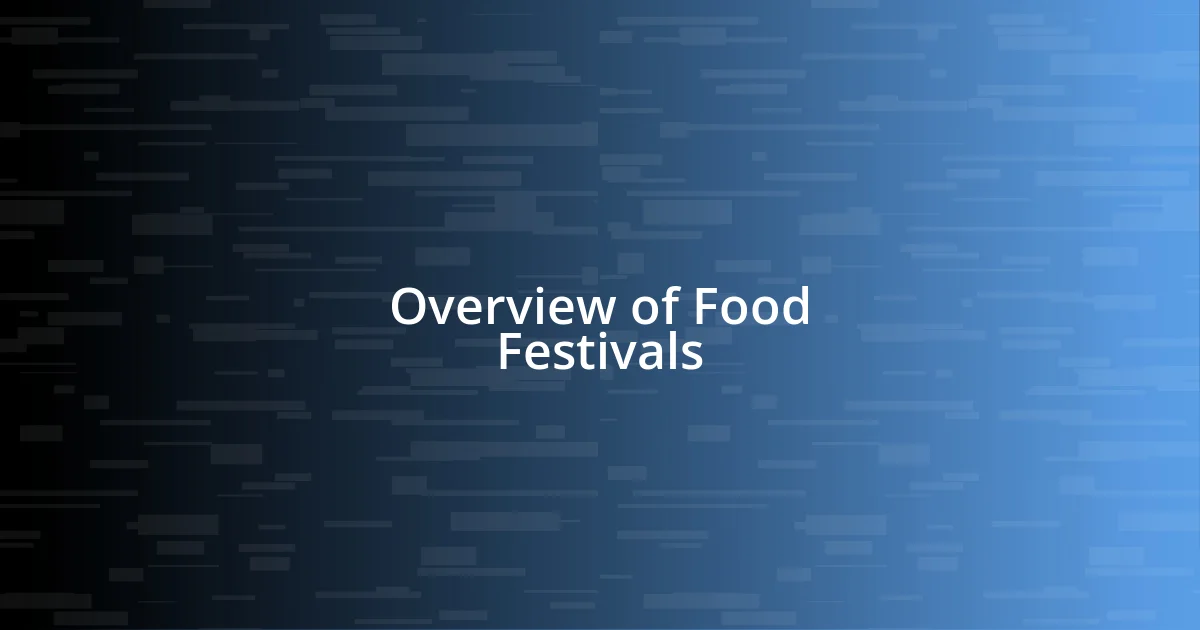
Overview of Food Festivals
Food festivals are vibrant celebrations that bring communities together, showcasing diverse culinary delights from around the world. From the tantalizing aromas wafting through the air to the joyful chatter of food lovers, these events create an atmosphere that’s almost electric. Have you ever felt a child-like excitement when discovering new flavors? That’s the magic of these festivals!
I remember attending a local food festival where artisan vendors displayed their handcrafted goods. It was a revelation! I chatted with passionate chefs and home cooks alike, each eager to share their culinary journey. How often do we get to connect with these creators in such an intimate setting? It’s truly a memorable experience that stirs not just the palate, but the soul.
What strikes me about food festivals is their role in promoting local culture and identity. Each dish tells a story, reflecting regional ingredients and traditions. Think about it: when was the last time you tasted something that transported you to another place? Food has a unique way of bridging gaps and fostering understanding in our ever-connected world, making these festivals more than just a feast for the senses.

Popular Food Festivals Globally
Food festivals around the globe attract visitors with their unique flavors and cultural significance. Each one is a feast for the senses, filled with local delicacies that often tell a larger story about the region. For instance, at a cheese festival in France, I was overwhelmed by the variety of artisanal cheeses, each with its own history. It wasn’t just about tasting; it was about discovering centuries of tradition behind every bite.
Here’s a quick look at some notable food festivals from different parts of the world:
- La Tomatina (Spain) – A lively tomato-throwing celebration that attracts thrill-seekers eager for a playful culinary experience.
- Oktoberfest (Germany) – While renowned for its beer, this festival also showcases traditional German foods that perfectly complement the brews.
- Street Food Festival (Southeast Asia) – A culinary adventure where every corner reveals mouthwatering street food stalls, showcasing local flavors in a vibrant setting.
- New Orleans Jazz & Heritage Festival (USA) – This fest not only highlights jazz music but pairs it with delicious Creole and Cajun dishes, creating a cultural explosion.
- Pasta Festival (Italy) – A celebration that’s more than just carbs, featuring fresh ingredients and a variety of pasta recipes that differ in every region.
These festivals not only satisfy hunger but also create a space where cultures collide and conversations flourish. When I indulged in homemade pasta at an Italian festival, it became clear that food serves as a universal language, connecting individuals through shared flavors and experiences.

Unique Cuisines at Festivals
Experiencing unique cuisines at food festivals is like embarking on a culinary adventure that can surprise and delight. For example, when I visited a food festival in Mexico, I had the chance to taste authentic mole. It was unlike anything I’d ever had—rich, complex, and layered with flavors. That dish truly captured the essence of Mexican cuisine, with its deep roots in tradition and culture. Have you ever found a dish that was so unique it changed your perception of a cuisine?
I recall a vibrant festival in India, where I dove into a myriad of street foods, such as pani puri and pav bhaji. Each bite was an explosion of spices and textures. Engaging with the food vendors, I learned about the stories and rituals behind these dishes, which deepened my appreciation. It made me realize how food can act as a vibrant expression of identity and community, inviting everyone to explore a region’s cultural tapestry through taste.
Additionally, festivals are a fantastic platform for innovative culinary creations. At a food truck festival, I stumbled upon a fusion taco, blending traditional Vietnamese banh mi with Mexican ingredients. What a game-changer! I think it’s this kind of creativity that reflects how food continues to evolve, merging cultures and flavors. Have you ever wondered how many culinary traditions are intertwined globally? The more you explore, the more connections you’ll find.
| Festival | Unique Cuisine |
|---|---|
| Feria Nacional del Mole | Mole from Puebla, Mexico |
| Kolkata Street Food Festival | Pani Puri and Pav Bhaji, India |
| Eat the Street | Banh Mi Taco Fusion, USA |
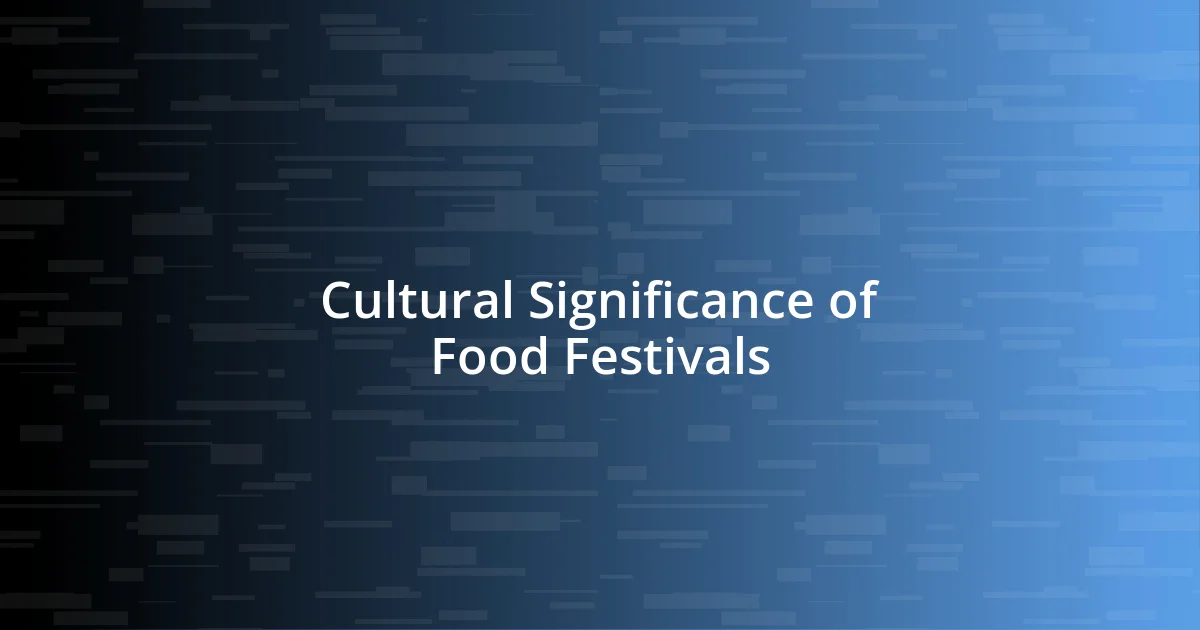
Cultural Significance of Food Festivals
Food festivals hold remarkable cultural significance, acting as vibrant showcases of local traditions and histories. When I attended a harvest festival in Italy, it felt like stepping into a shared family celebration; the locals proudly displayed their homemade goods, connecting generations through food. Isn’t it fascinating how a simple dish can encapsulate centuries of stories, rituals, and the very essence of a community?
Moreover, these festivals often serve as a bridge between people of different backgrounds. I remember chatting with an elderly vendor at a cultural fair, who recounted tales of her grandmother’s recipes that had been passed down through the family’s history. As she served me a dish filled with love and nostalgia, I was struck by how food fosters relatability and understanding. Can you imagine savoring a dish while learning about its place in someone’s life? That intimate exchange made the experience even more special.
In my view, food festivals also empower local economies by promoting regional ingredients and artisanal crafts. I recall visiting a small food festival in my hometown where local farmers showcased their produce. The pride in their work resonated throughout the event, creating a palpable sense of community. It made me think: how much would we lose if we did not celebrate these culinary traditions? Ultimately, each festival is a gentle reminder of the importance of preserving and sharing cultural narratives, nourishing both body and soul.
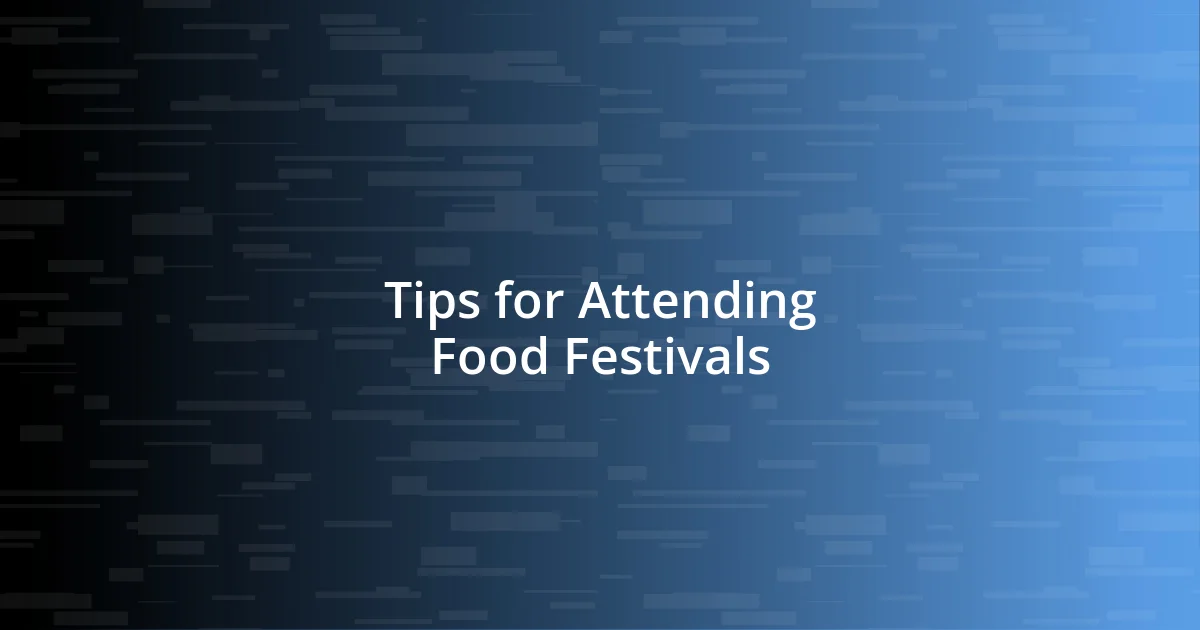
Tips for Attending Food Festivals
When you’re gearing up to attend a food festival, I recommend arriving early. This gives you a chance to explore before the crowds pour in. I can’t tell you how many times I’ve stood in long lines, wishing I’d gotten there sooner! Plus, you’ll have the luxury of wandering without being rushed, allowing you to savor every unique dish at your own pace.
Another tip I swear by is to wear comfortable shoes. Trust me, there’s nothing worse than realizing halfway through the day that your feet are killing you! I once spent an entire afternoon at a festival in France, captivated by the cheese vendors, only to be sidelined by aching arches. Comfortable footwear not only keeps you happy but also lets you roam freely, ready to dive into new flavors and experiences.
Lastly, don’t hesitate to ask vendors for their recommendations. They often have a treasure trove of insights about their dishes that you won’t find anywhere else. I remember during a festival in Thailand, a vendor pointed me towards a spicy mango salad with a secret ingredient that took the taste to another level. That kind of insider knowledge enhances the experience and opens up a world of culinary exploration—how else can you discover such hidden gems?
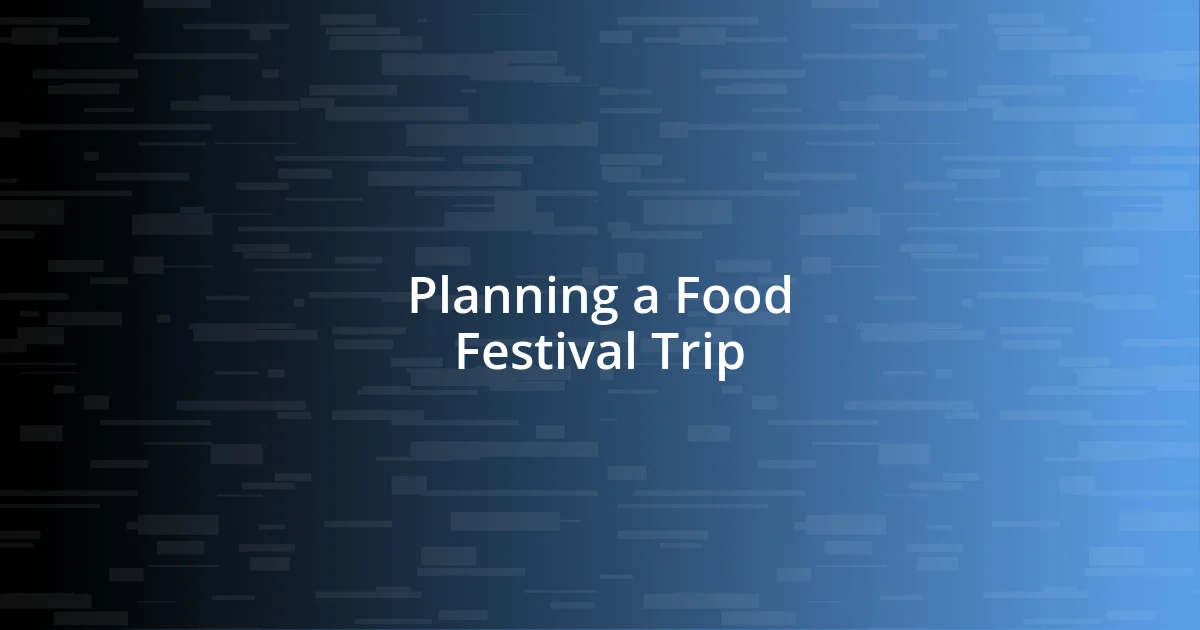
Planning a Food Festival Trip
When planning a trip to a food festival, I’ve learned that timing can make all the difference. If you’re eyeing a popular event, booking accommodations well in advance can save you from scrambling at the last minute. I recall a time when I nearly missed out on a fantastic food festival in Spain because I postponed my booking—only to find out that the best spots were already taken! Have you ever felt that rush of anxiety while searching desperately for a place to stay?
Researching the festival’s lineup before you go is another way to enhance your experience. I remember stumbling into a culinary celebration in Mexico and discovering a gourmet taco-making workshop that I hadn’t expected. The thrill of finding such a gem made the trip even more exciting. Wouldn’t you agree that having a plan makes it easier to dive into spontaneous adventures when you have the basics covered?
Lastly, consider the transportation options available at the festival. I once attended an event in a city where public transport was a breeze, and it made my journey stress-free. I could savor the flavors without worrying about navigating a car rental or parking woes! Isn’t it nice to focus entirely on the food and the fun, knowing you can get around easily?










